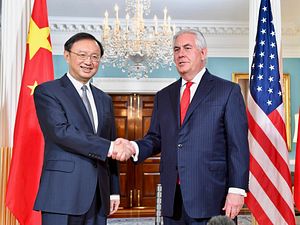Chinese State Councilor Yang Jiechi, China’s top diplomat, is visiting the United States from February 8 to 9.
On February 8, Yang had a working luncheon with U.S. Secretary of State Rex Tillerson at the State Department.
At the start of their meeting, Tillerson told the press that “I very much warmly, warmly welcome him [Yang] here” since “[w]e’ve had many, many good discussions.”
Yang replied in fluent English that he is sure “we will carry out the agreement between our two heads of state and push forward our very important relationship.”
State Department spokesperson Heather Nauert told a news briefing later that both sides “reaffirmed President Trump’s and President Xi’s commitment to keep up pressure on North Korea’s illegal weapons and nuclear programs” and “agreed on the importance of continuing a constructive and productive relationship aimed at cooperation on mutual challenges and addressing our differences forthrightly.”
However, the “warm” diplomatic remarks scan’t cover rising frictions on various issues between the two nations.
Recently, the United States has repeatedly singled China out, claiming that it (together with Russia) is the United States’ major rival.
In both the 2018 National Defense Strategy issued by the U.S. Department of Defense (DoD) and the National Security Strategy released by the White House, Washington referred to China as the central challenge to U.S. prosperity and security. The more recent Nuclear Posture Review, also published by DoD, further pointed out that China’s nuclear strength is a threat to U.S. interests in Asia.
Besides security issues, trade is another powder keg for both sides.
U.S. President Donald Trump has constantly blamed China for the U.S.-China trade imbalance and threatened to launch a trade war. Last month, Trump decided to impose steep tariffs on washing machines and solar panels — two of China’s important export products. He also mentioned plans to sanction China severely for intellectual property theft.
“We have a very big intellectual property potential fine going, which is going to come out soon,” Trump said in an interview. “We’re talking about big damages. We’re talking about numbers that you haven’t even thought about.”
Faced with a looming crisis between the two nations, Yang seems to be Beijing’s best choice negotiate with Washington, as he is famous for his experience in managing U.S.-China relations.
In the late 1970s, Yang accompanied George H. W. Bush and his family as an interpreter during the future president’s trip to China. The Bush family reportedly got along with Yang so well that they gave him the nickname “Tiger Yang,” since Yang was born in the year of the tiger.
As a specialist in U.S. affairs, Yang has been assigned to the United States three times, first as second secretary from 1983 to 1987, then as minister of the embassy from 1993 to 1995, and ultimately as ambassador from 2001 to 2004.
One of the most significant diplomatic feats Yang achieved in Washington was helping mediate a solution after the Hainan Island incident in April 2001, when a U.S. military plane collided with a Chinese fighter jet over international waters off China’s southern coast. With Yang’s efforts, both nations finally found a way to solve the crisis without losing face.
It’s particularly worth mentioning that Yang, 68, was elevated to the Chinese Communist Party’s Politburo — China’s second-highest top decision-making body — during the 19th Party Congress last year. This promotion made Yang the first diplomat to become a member of the Politburo since Qian Qichen, who served as China’s foreign minister from 1988 to 1998, and as vice premier from 1993 to 2003. Given this precedent, there is a widely circulated rumor that Yang will soon be appointed to the position of vice premier, too.
Whether the rumor proves true or not, it’s for sure that Yang will keep playing an important role in managing U.S.-China relations, especially during periods of potential crisis.

































